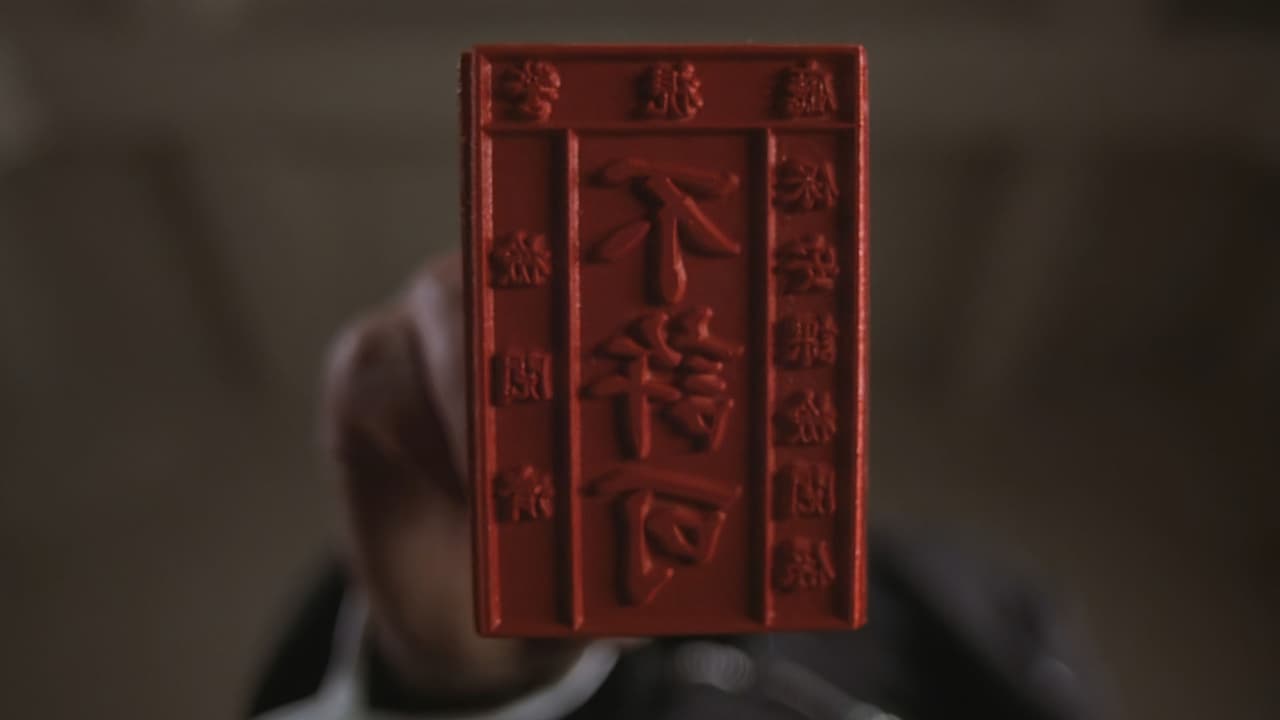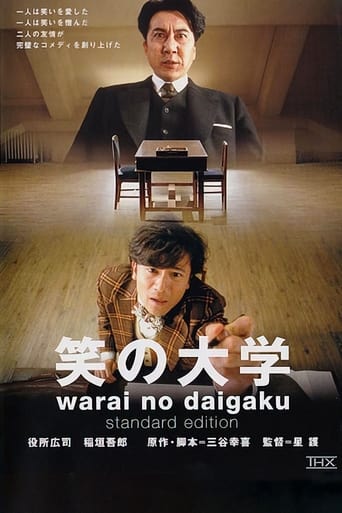

Not even bad in a good way
... View MoreThere is just so much movie here. For some it may be too much. But in the same secretly sarcastic way most telemarketers say the phrase, the title of this one is particularly apt.
... View MoreIt's a good bad... and worth a popcorn matinée. While it's easy to lament what could have been...
... View MoreIt's a movie as timely as it is provocative and amazingly, for much of its running time, it is weirdly funny.
... View MoreThe story is set in the age when the comedy in public was restricted by the government. An inspector and a comedy writer make a comedy within the legally permissible level together. The funny words and rhythmical music still linger in my head because two of them repeat practices again and again while working out a detailed plan. This film was scripted by Koki Mitani who is the famous scriptwriter and director in Japan. Most of his works are comedies and make me laugh every time. As the title says, this film also makes me laugh. I like Koji Yakusho who plays the part of the inspector in this film and he appears on most of works by Koki Mitani. In this film, "Mitani World" is developed like other his works. I recommend everyone to watch the film because the film not only is funny but also describes the times.
... View MoreWriting comedy is hard, especially, if you have to face an authoritarian, ex-soldier censor officer who never laughed all his life and was proud of it. That's the premise of this extraordinary movie which is set in Japan during WWII. It is originally a play, so we can hope for tons and tons of witty dialogs between the young playwright and the censor officer. The former is struggling to get approval of his next comedy script while the latter is determined to close down all theater performances in the city, simply because " it is inappropriate to get a few laughs during this time of war " Then, suddenly, the movie turns into a lesson of how to write a good comedy as the censor officer keeps criticizing the script and demands changing. There are lots of warm and funny moments, but toward the ending, it suddenly becomes tense and heartbreaking. It almost becomes a tragedy. The whole movie is basically played by those two characters. Other characters can easily be extras. The setting is very minimalist as nearly 80 percent of the movie is located inside the interrogation room. The message we can get from this movie is that there is always comedy inside anybody's life, whether you want it or not. It is no use denying it. Just as it is no use denying not to like this incredible movie once you see it.
... View MoreIt is amazing and rare when a film manages to reach us and surprise us by succeeding our expectations. In my personal experience, THE UNIVERSITY OF LAUGHS is one of such films. What I loved the most about this particular film is how complex issues which throughout history have affected cultural expression can be represented and illustrated in such a fine and simple fashion.Sakisaka, a government official entrusted with creating favorable conditions for the maximum expansion of the ruling ideology, through the censorship and manipulation of messages in popular culture meets his counterpart in a humble theater script writer seeking approval for his latest project. The movie evolves and progresses as both, censor and writer work together, with and against each other to achieve their individual interests.My favorite moment is that in which Hajime Tsubaki becomes aware that his interest and passion for comedy writing, transcends the personal and collective interests of his boss, his colleagues and even his nation. He can live with the criticism and punishment offered to him by friends, peers and society at large but he cannot live without being true to himself, therefore, he is left with no option but to follow his comic nature through his gift of writing. This is the most purely political phase in the film, and it marks the decisive passage of struggle from the individual structure, to the sphere of the complex superstructures.In all, this is a beautiful and clever display of Japanese culture and worldwide struggle for freedom of speech, and a subtle reminder of how far we have come to reach the stage of cultural freedom that many of us enjoy today.
... View MoreThis is one of the few films which prior to its viewing I knew extremely little about, due to the lack of buzz and reviews it had acquired on the net, but knowing Koji Yakusho through various Kiyoshi Kurosawa films and such I gave it a try.The film is set in 1940, at a time when humor was greatly overshadowed with tragedy all over the world, but still piercing through the hardship and censorship to give people a chance and a reason to laugh. Right from the start we hear grandiosely orchestrated big band music that immediately assists the film in creating an atmosphere of that particular era and even creates a pleasant sound of classic comedy satires that now rarely see the light of day.Yakusho convincingly plays Sakisaka, a gloomy reviser who has been able to live through life without much comedy and Inagaki plays Hajime Tsubaki, a scrawny writer who's in dire need of getting his script approved by any means possibly, which includes not only in removal of certain context but also daily convincing Sakisaka of its intent, logic and essentially its power of being humorous or not. In the midst of all the quarreling and brainstorming, it gives a new life to the repressionist of joy and pushes another visionary to the limits of perfection.At one point it did came close to overdoing Sakisaka'a final transformation, but never to the point of frustration or redundancy. I also thought that the comical subplot of the film could have been a little more humorous. Nonetheless it was an interesting little film that for the most part hit the right spots and moved me along the way with its simplistic approaches and solitary scenery that included some touching moments and harmless jests.
... View More